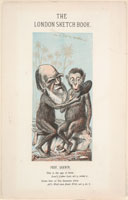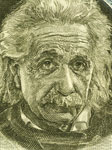Student Zone
Science and Religion » History » Post-enlightenment
Certainly, scientific research revealed the glory of God by displaying the mind-bending complexity and order and apparent purpose, but it also suggested that "nature is red in tooth and claw" (as Tennyson wrote), that human beings may not be the favoured masters of all creation and that supposing a purpose for the universe may be crude and simplistic. Many of the scientists of this period were religious - indeed, there was a high proportion of clergymen amongst their ranks, using their scholarship and leisure time to advance the boundaries of knowledge of the natural world. However many soon had to face difficult questions as a result of their research. Charles Darwin was just one such. He delayed publication of his On the origin of the species (which eventually appeared in 1859) for many years, perhaps for fear of alienating his devout wife. His own scepticism advanced slowly; he found Paley's Natural Theology (1802) convincing when preparing for holy orders at Cambridge but after the loss of three children and years of botanical study he could no longer hold to a faith in an all-powerful, loving God.
 Darwin's theory of evolution by natural selection was not an entirely new idea. Darwin did however provide the evidence to support the theory, making it a convincing argument. That did not mean that his ideas were accepted without resistance however. Famously his supporters were mocked for seeing human beings and apes as descendants of a common ancestor. The theory did not gain widespread acceptance until the mid-twentieth century and, in America, there are still huge numbers of people who refuse to accept the theory of evolution and campaign for it not to be taught in schools.
Darwin's theory of evolution by natural selection was not an entirely new idea. Darwin did however provide the evidence to support the theory, making it a convincing argument. That did not mean that his ideas were accepted without resistance however. Famously his supporters were mocked for seeing human beings and apes as descendants of a common ancestor. The theory did not gain widespread acceptance until the mid-twentieth century and, in America, there are still huge numbers of people who refuse to accept the theory of evolution and campaign for it not to be taught in schools.
Evolution vs a design argument
The theory of evolution by natural selection is based on inductive reasoning; it is an a posteriori, strong, argument which in this shares characteristics with both cosmological and teleological arguments. The difference is the weight of evidence on which the conclusions are supported; today there is a very great weight of evidence supporting Darwin's argument. The statement "species evolve to suit the prevailing conditions through a process of natural selection" is verifiable. Some critics have suggested that it might be falsified, however, with particular reference to the theory's inability to account for phenomena such as the irreducible complexity of natural systems, the existence of specified complexity in nature, the existence of incredibly beautiful or complex organisms such as the human eye, or certain behaviour patterns such as love and altruism. Proponents of versions of the design argument for the existence of God tend to be the loudest critics of Darwin.
Dawkins' arguments
 Richard Dawkins has made a spirited effort to fight back, to state the evidence in support of evolution, to argue that it is so persuasive that Darwin's theory is all but a fact and to refute alternative arguments. In The blind watchmaker (1986), Dawkins argues that natural selection is "blind". An "unconscious automatic process", it has no aim, no purpose. "Evolution has no long-term goal. There is no long-term target, no final perfection to serve as criteria for selection ... The criteria for selection is always short-term, either simply survival or, more generally, reproductive success. The "watchmaker" that is cumulative natural selection is blind to the future and has no long term goal."
Richard Dawkins has made a spirited effort to fight back, to state the evidence in support of evolution, to argue that it is so persuasive that Darwin's theory is all but a fact and to refute alternative arguments. In The blind watchmaker (1986), Dawkins argues that natural selection is "blind". An "unconscious automatic process", it has no aim, no purpose. "Evolution has no long-term goal. There is no long-term target, no final perfection to serve as criteria for selection ... The criteria for selection is always short-term, either simply survival or, more generally, reproductive success. The "watchmaker" that is cumulative natural selection is blind to the future and has no long term goal."
In The selfish gene (1976) Dawkins claims that human beings only act so that their genes may survive. All we are is mechanisms to pass on our genes in competition with other species. We are simply the mechanisms used by our genes to replicate themselves: "We are survival machines - robot vehicles blindly programmed to preserve the selfish molecules known as genes."
 He argues that human beings have evolved to meet the conditions available; there is no purpose and no meaning to our existence. We are simply what evolved; our ability to understand our place in the universe is remarkable and fills Dawkins with awe. He understands human beings strictly in terms of biology - we have about 5 billion cells each containing 46 chromosomes and 23 base pairs. Each chromosome contains tens of thousands of genes. Dawkins describes DNA as follows:
He argues that human beings have evolved to meet the conditions available; there is no purpose and no meaning to our existence. We are simply what evolved; our ability to understand our place in the universe is remarkable and fills Dawkins with awe. He understands human beings strictly in terms of biology - we have about 5 billion cells each containing 46 chromosomes and 23 base pairs. Each chromosome contains tens of thousands of genes. Dawkins describes DNA as follows:
"It is raining DNA outside. On the banks of the Oxford canal at the bottom of my garden is a large willow tree and it is pumping downy seeds into the air ... not just any DNA, but DNA whose coded characteristics spell out specific instructions for building willow trees that will shed a new generation of downy seeds. These fluffy specks are literally spreading instructions for making themselves. They are there because their ancestors succeeded in doing the same. It's raining instructions out there. It's raining programmes; it's raining tree-growing, fluff spreading algorithms. This is not a metaphor, it is the plain truth. It couldn't be plainer if it were raining floppy discs."
Dawkins' assumptions about believers - a false dichotomy
Dawkins' arguments are very persuasive, but one issue that could undermine his position is the naïve impression that he has of what most religious people actually believe. He attacks Christians for taking a literal view of the Bible and for holding that God created the universe literally in seven days, yet no serious theologian or philosopher in Britain thinks this and few enough ordinary Christians either. Would it be reasonable for a theologian to attack science on the grounds of what a few ordinary people think is what science claims about evolution, without referring to what experts actually say?
Most hold that the creation stories are myths, metaphors which point towards a truth beyond which is difficult to talk about in everyday terms. It is clear that myths, metaphors and symbolic language can convey deep and important truths and indeed some critical realists have pointed to the fact that science itself often uses these forms of language when normal words and grammar is inadequate to convey realities beyond normal experience.
 Dawkins and some scientists, who see science as necessarily opposed to religion, set opposing arguments up as if there are only two possible explanations for the universe: either the universe was created through a Big Bang and life evolved through a process of natural selection or an old man with a white beard said "let there be light" one Sunday morning about 4,500 years ago. This is a false dichotomy. It is possible that neither explanation is right - or that elements of both explanations are true.
Dawkins and some scientists, who see science as necessarily opposed to religion, set opposing arguments up as if there are only two possible explanations for the universe: either the universe was created through a Big Bang and life evolved through a process of natural selection or an old man with a white beard said "let there be light" one Sunday morning about 4,500 years ago. This is a false dichotomy. It is possible that neither explanation is right - or that elements of both explanations are true.
Can one be open-minded when it comes to matters of truth? Scientists would point to the reams of evidence in support of the theory of evolution by natural selection and would find the idea of questioning the theory and teaching the stories of primitive civilisations in laboratories offensive. However, as historians of science such as Kuhn and Feyerabend have pointed out, it is a recurring feature of science to be committed to one paradigm to the extent that it causes opposing evidence to be excluded and the progress of knowledge to be slowed. What is the best way forward? There are certainly some things that evolution struggles to explain.
How many million years?
 One is the timescales for change. As we can observe it, natural selection takes much longer to achieve the evolution of species than the fossil record indicates such change actually took. Further, we cannot observe any case of natural selection leading to one species transforming into another, only of changes taking place within biological classifications. Scientists argue that it is only a matter of time before such detail is filled in by researchers, but those opposed to evolution argue that something else is needed to explain these phenomena, namely God.
One is the timescales for change. As we can observe it, natural selection takes much longer to achieve the evolution of species than the fossil record indicates such change actually took. Further, we cannot observe any case of natural selection leading to one species transforming into another, only of changes taking place within biological classifications. Scientists argue that it is only a matter of time before such detail is filled in by researchers, but those opposed to evolution argue that something else is needed to explain these phenomena, namely God. Groups such as Answers in Genesis employ experienced teachers who tour schools sharing their creationist perspective and pointing out to young people all the things that evolution cannot explain. They suggest that God may have created creatures of each genus and then started a process of evolution to refine his creations within a dynamic world. In Britain some new academy schools have been founded by creationist groups who choose to teach evolution only as one theory alongside alternative theories such as divine creation in science lessons. Needless to say, this remains extremely controversial.
Groups such as Answers in Genesis employ experienced teachers who tour schools sharing their creationist perspective and pointing out to young people all the things that evolution cannot explain. They suggest that God may have created creatures of each genus and then started a process of evolution to refine his creations within a dynamic world. In Britain some new academy schools have been founded by creationist groups who choose to teach evolution only as one theory alongside alternative theories such as divine creation in science lessons. Needless to say, this remains extremely controversial.
Einstein's legacy
Albert Einstein (1879-1955) was an unlikely candidate to change the course of science, a Swiss patent-clerk who couldn't get a job as a teacher. Nevertheless, his work caused another paradigm-shift and opened the door for splitting the atom, quantum mechanics and technologies from the moon-landings to the mobile phone. In 1905 Einstein published his doctoral dissertation and four more papers, which made his reputation as one of the most important minds of his generation. He called 1905 his annus mirabilis.
Einstein is best known for the formula e=mc2, his theory of special relativity, but this is just one of his advances. He developed a theory of general relativity, put forward new ways of looking at thermodynamics and photons, advocated the use of a priori principles in physics and advanced quantum mechanics. He also directed his discoveries towards cosmology, asking what they could tell us about the nature of the universe as a whole. Einstein made sense of the universe by hypothesising a "cosmological constant", and using this supposed that the universe could be an eternal static sphere.
 Einstein's static universe was an accepted paradigm for much of the twentieth century. Physicists such as Fred Hoyle hung onto this theory even when most others had accepted the Big Bang theory of an inflationary universe with a beginning and an end. The Big Bang Theory gained acceptance in the 1960s, once evidence from astronomy (Hubble) and radio interference (Penzias and Wilson) had been produced to support its claim to truth. British physicists Stephen Hawking and Roger Penrose were instrumental in making the case for the Big Bang at this time. The BBC docu-drama Hawking explores this and is available on YouTube. Some of Einstein's other theories have stood the test of time much better.
Einstein's static universe was an accepted paradigm for much of the twentieth century. Physicists such as Fred Hoyle hung onto this theory even when most others had accepted the Big Bang theory of an inflationary universe with a beginning and an end. The Big Bang Theory gained acceptance in the 1960s, once evidence from astronomy (Hubble) and radio interference (Penzias and Wilson) had been produced to support its claim to truth. British physicists Stephen Hawking and Roger Penrose were instrumental in making the case for the Big Bang at this time. The BBC docu-drama Hawking explores this and is available on YouTube. Some of Einstein's other theories have stood the test of time much better.
Quantum reality
Quantum mechanics has thrown new light on the way the universe works on the smallest level, how matter and energy interact. Bohr, one of the fathers of quantum science, famously remarked that if you claim to understand quantum physics, you don't, and Richard Feynman said, "I think I can safely say that nobody understands quantum mechanics!" The mathematics behind quantum mechanics is abstract and its implications are non-intuitive; things don't behave as we would expect them to on a sub-atomic level and this throws into question "certainties" about the universe that most of us take for granted. For example, "quarks" can be in two places at the same time and can both exist and not exist simultaneously, and they are influenced by the process of observation. Basic principles of logic and scientific research are challenged by the world quantum research describes.
Room for doubt
The influence of this new uncertainty can be seen in the writings of critical realists and has been particularly well-received by believers, who felt threatened by scientific pretentions to explain everything and who find the new, more mysterious world that science is suggesting might leave room for God and faith. These include John Polkinghorne and Alister McGrath.
Physicists such as Max Planck, Werner Heisenberg and Neils Bohr advanced quantum theory during the 1930s and 1940s but many of its implications are still being worked out today. One of the differences between quantum physics and classical physics is that quantum only provides a range of possibilities and probabilities, not definite conclusions. If, as Wittgenstein observed in the Tractatus, "the universe is all that is" and quantum physics demonstrates there are a range of possibilities, perhaps multiple universes must exist - to enable all the possibilities that exist to coexist when in our world things must either exist or not exist, and cannot do both or neither despite the science suggesting that they must ... These "multiverses" would never be accessible to us and are really no more than a logical hypothesis, but the influence of this way of seeing reality can be seen beyond science in the philosophy of religion, in the work of Plantinga and Swinburne, for example, both of whom hypothesise about the existence of multiple universes containing all possible states of affairs and then try to reason back to why God would create this world rather than any other.
God and the Big Bang
The Big Bang theory is less of a threat to religion than the theory of evolution through natural selection. Indeed, it seems to support the idea of a temporal creation and is probably compatible with the cosmological argument. The singularity that caused the big bang about 13.7 billion years ago could truly be said to be "neither something nor nothing" as Aquinas described God. Stephen Hawking in A brief history of time (1988) was satisfied to say that if this is what people meant by God then he could accept that the cause of the Big Bang could be God. He has since changed his mind however, in his 2009 book The grand design.
book The grand design.
Professor Alister McGrath, along with several other high-profile and well qualified scientists who are also believers, argues that it is a good scientific principle that if a postulated explanation is simpler and has greater explanatory power than alternatives, then it should be taken seriously. They suggest that it is more credible to say that God caused the precise conditions necessary for the Big Bang to produce our universe than to say that it is just an unbelievably improbable fluke. This is not a proof that God exists - but it does point to God as being a hypothesis that needs to be taken seriously.


